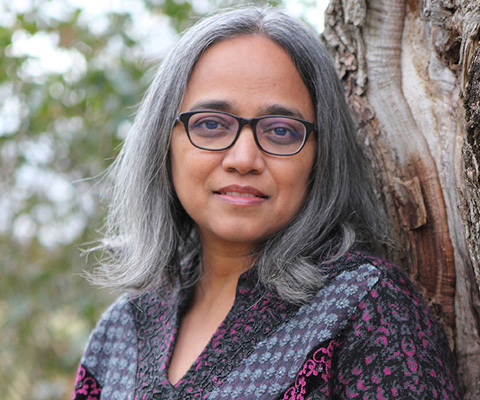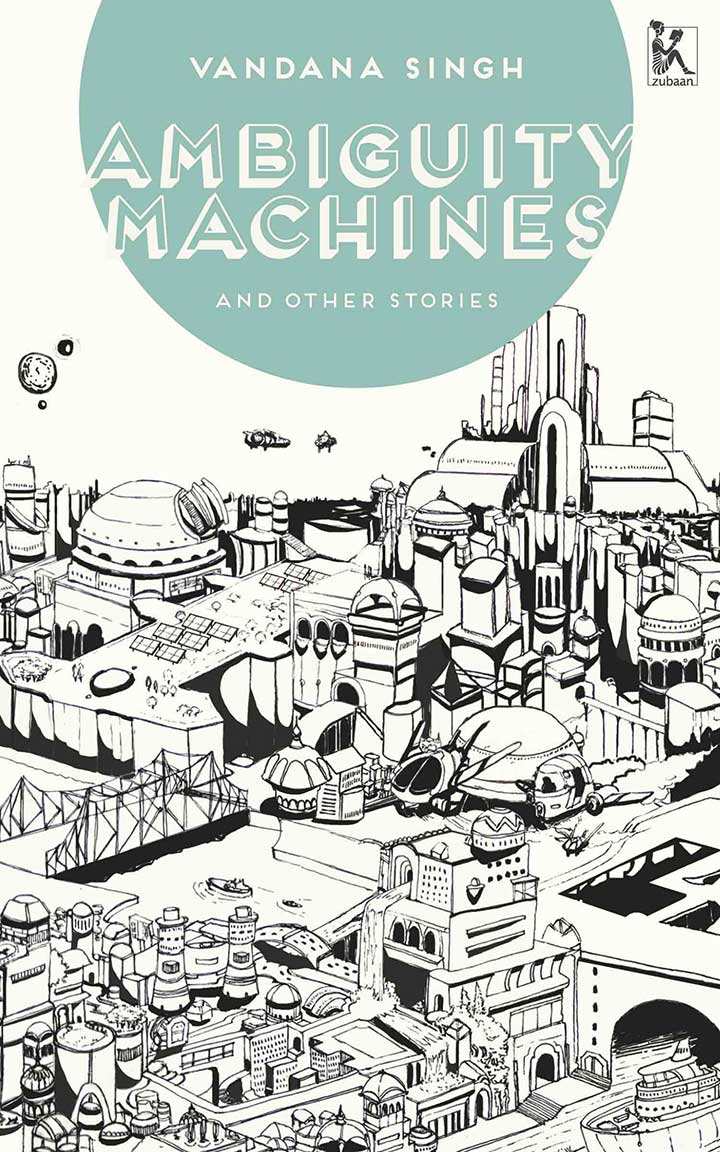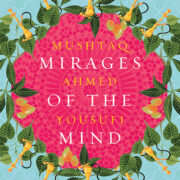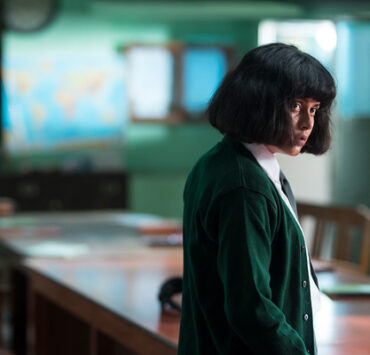Ambiguity Machines and Other Stories, Vandana Singh’s latest collection of short stories, brings together thirteen previously published works and one new, haunting piece, ‘Requiem’, that serves as an exploration of language, climate change, and resistance.
A finalist for the 2019 Philip K. Dick Award, the stories in the collection are kaleidoscopic in nature, examining and rearranging concepts of identity, time, technology, and memory, and letting them shape and build on each other. Above all, her political, open-hearted speculative fiction chips away at perceived boundaries and seeks to transcend them. Singh, who is also a physics professor, often uses scientific concepts as a basis for creating immersive, dream-like stories that can feel reminiscent of reading poetry.
Read on for an exclusive interview with the author.
In what ways has being a physics professor shaped your writing? Are there times that the mindset you’ve cultivated as a writer has helped your work as a physicist?
Writing fiction and thinking physics are not two separate aspects of my life; in fact one feeds the other. To me, physics is our attempt to listen to what Nature is telling us about certain aspects of the universe, and to retell the stories of protons, rocks, planets, and so on (if in somewhat esoteric mathematical language). Non-physicists take the physical world for granted, but the world is always telling us stories. It is a measure of the modern human’s unhealthy obsession with the exclusively human that we shut out all other voices, other stories. For me, the stories of protons, rocks, planets, non-human animals, humans different from us, are all fascinating. So, yes, indeed, my stories are shaped by my being a physicist. And it works the other way around too. Although my background is in particle physics, in recent years I’ve been transitioning to climate change science, conceptualising it in an interdisciplinary way, and my storytelling side has definitely contributed.
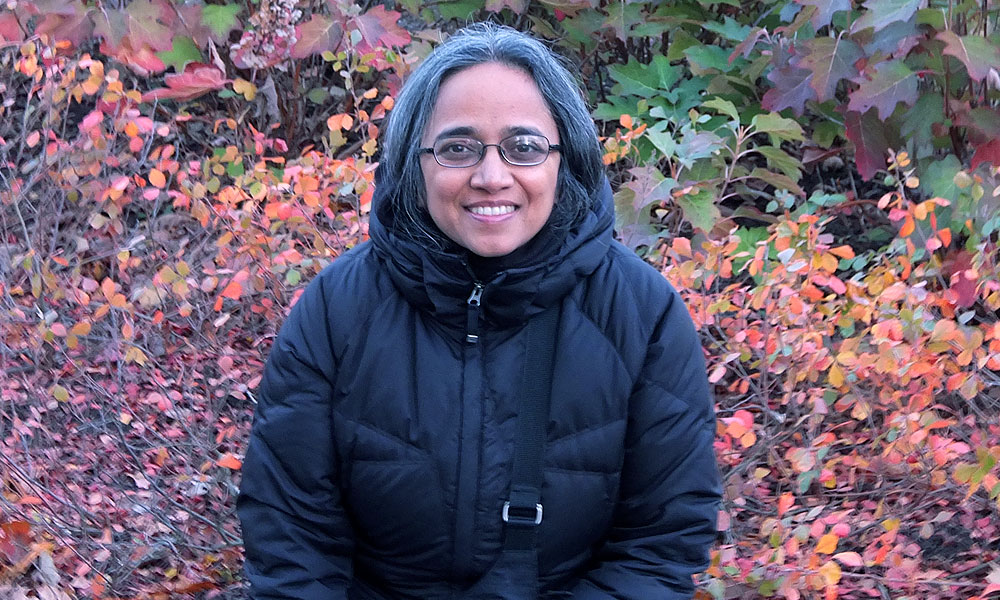
Vandana Singh. Photograph by Lucille Riddle.
You have described feeling a sense of alienation when moving to the United States from India. Can you tell me more about this, and how this has influenced your writing? Do you think it is helpful — or even necessary — for writers to have a sense of otherness?
Well, I went to the U.S. as a graduate student, and was struck by the fact that my relatively extensive reading of American literature and knowledge of geography and history did not prepare me for the immersive experience of differentness. Even though I supposedly spoke the same language, there were differences in idiom and connotation, as well as behaviours, customs, conceptions of home, family, privacy — all these revealed deeper differences, the harder I looked. I also experienced racism for the first time, a literally alienating experience that taught me a lot about the human capacity to ‘other’ those ‘not like us’, and helped me relate to the experiences of marginalised people in India. Then of course the environs were different than Delhi, where I was born and brought up — the grass, trees, birds, structures of houses. So the sense of not belonging was paramount. What this brought about, I think, was a deeper interest in exploring this strange and foreign place, and also, in reconceptualising my idea of India. The distance from my country somehow helped me to see some things better. And the constant homesickness, a feeling I carry to this day, made me pay attention to what it is we consider home and belonging. My more recent exploration of tribal cultures in the context of climate change led me to realise that this notion — belonging to a place — is something us moderns barely understand; indigenous people who have not been displaced from their traditional lands really know what it means to belong. So, naturally, all this comes up in my writing.
The best writers extend themselves toward other selves, even when those lives and perspectives are outside their personal experience. A certain empathic imagination is necessary. Otherness, alienation, is all around us, whether home or abroad, because all our social systems are built on hierarchies such as class, caste, race, gender, not to mention speciesism. So you don’t have to leave home, you just have to open your eyes.
‘Oblivion: A Journey’ incorporates the mythology of the Ramayana, while ‘A Handful of Rice’ includes ayurvedic theories and prana flow in the storytelling. How would you describe the influence of Indian folklore, mythology, and religious traditions on your writing?
I was brought up on the old epics — I heard them long before I could read, from my mother and paternal grandmother, liberally seasoned with their interpretations and interpolations. But I was also brought up in a milieu that was lively, argumentative, and open-minded. I learned to sing parts of the Tulsidas Ramayana for my grandmother, and as kids we were part of religious ceremonies like Saraswati puja. At the same time, my paternal grandparents were both deeply opposed to the caste system. It was from my grandfather that I learned that there were many Ramayanas, and that from the radical perspective of the Upanishadic traditions, there was room for all of them, including the perspective of Ravana. My grandparents were also strong believers in communal harmony, and we had close friendships with people of multiple religions. So I grew up with this syncretic, generous, organic, welcoming tradition, where discussions embraced religion and science, and dissent was considered valuable and necessary. In fact, India has an ancient tradition of honouring dissent and debate. All this remains essential to my very being.
In ‘Somadeva: A Sky River Sutra’, characters feel like more than their individual selves when they are together, and in ‘Ambiguity Machines’, certain characters nonverbally and continuously share their emotions. There are several other examples of fixed identity being challenged throughout the collection. Would you say that you’re interested in interrogating concepts of personhood, and if so, why?
One of the culture shocks I experienced in the U.S. was the great importance given to the individual, to a rather rigid conceptualisation of individuality. Individualism is not something I am opposed to per se (after all, we depend on various individual rights in order to exist in modern society), but it seems to me that it is taken to an extreme in Western societies. Attached to this notion of individualism is personal privacy, to a degree that is strange to anyone brought up in India. The result, I believe, is a kind of social isolation that can be very stressful. In fact, in a recent survey carried out by a health insurance company reported ‘epidemic’ levels of loneliness among Americans, especially primarily elders and young people.
When teaching climate change, I see that some of the despair that my students feel results from their reacting to the climate crisis as individuals. It is not a problem that can be solved by a lone ranger hero or even a band of brave avengers. It needs enlightened collective action. And the kind of paradigm that has brought about such a crisis is also worth examining, because it is based on another kind of isolation — a separation of the human from the rest of Nature. Consider the fact that half the cells in our body are not even human. We are aggregates, ecosystems!
I was a very shy kid growing up — outside family and close friends, I was most comfortable with nonhumans. The local pariah dogs, parakeets in the Neem trees, mynahs cackling on the window sill — these were my first friends and confidants. I learned quite early in life that personhood is not something that belongs to humans alone. And I’m continually fascinated by the notion of expanding one’s consciousness beyond our various identity labels through negation. We see this in Hinduism, Buddhism, Sufism, from ‘neti, neti’ to ‘Bullah ki jana main kaun’.
Identity is an important thing in our struggle for rights, to overturn, for example, patriarchy or caste or religious discrimination. Even if somebody without, say, caste privilege, doesn’t want to think about caste, they are forcibly reminded of it through the structural inequities in our society, through their daily experience of discrimination. The same is true of race in America. So you can’t deny that these identifiers exist. But we are more than the labels society forces upon us. Identity is a contextual thing, after all. As a brown woman in the U.S., I am potentially subject to both race and gender discrimination. But when I am walking through the woods with no other human being around, I can consciously, if temporarily, free myself from being a brown woman, and simply be an animal in the forest, an Earthling. It is wonderfully freeing, even if it is a temporary privilege. Identity need not be the rigid thing we make of it. I am interested in the slipperiness of this notion and enjoy playing with it in fiction.
‘Requiem’ examines the collision of sustainable, traditional ways of life with that of modernity and corporate greed. Given the relevance of this topic for our times, are there specific events, people, or places that inspired you to write the story?
I had the good fortune to visit the North Shore of Alaska during my sabbatical in 2014. This was part of a project to create an interdisciplinary undergraduate education project on climate change. Standing at the edge of the frozen Arctic Ocean, I felt decentred, shaken loose from my moorings. Climate change suddenly became tangible, real. Here was the Northern ice cap of our planet, so crucial a regulator of Earth’s temperature, in dramatic decline. I spoke to Inupiaq whalers, administrators, scientists. The Arctic had already inspired one novella about climate change before I ever visited it, but ‘Requiem’ took four years to ferment in my mind before I could set it down in ink and electrons. So I would say that definitely the Arctic and its peoples were my first inspiration. But also I am continually inspired by the courage of indigenous people all over the world, from Native Americans in North America to our own tribal peoples — the Dongria Kondh in Odisha being just one example.
One of the things we know is that the most biodiverse places in the world are also places where indigenous people have thrived for millennia. They are the ultimate successful humans — they have learned to live in harmony with their environs without destroying the very basis of their existence. Judge their track record against our modern industrial civilisation, which for all its technological razzle-dazzle is set to destroy itself in less than a couple of hundred years of existence! I think we have a lot to learn from them; even the United Nations recognises the value of indigenous knowledge. But instead there is a worldwide brutal war against indigenous people, simply because they stand in the way of profiteering thugs. Witness what’s happening in the present day in India — the pristine Hasdeo Arand in Chhattisgarh, where very quickly open cast mining has begun being just one example. If we are to save ourselves from the worst effects of climate change, we must protect the rights of indigenous people to their lands.
Does climate change impact the ways that you think about writing speculative fiction? How do you think writers such as yourself can contribute to our understand of climate change?
Indeed it does. You can’t write near-future fiction of any kind without acknowledging climate change, because that is our reality. The climate crisis is a symptom of a socioeconomic system that is rotten to the core, which dictates our daily lives and relationships. I decided to learn about climate science some ten years ago, because I wanted to know what all the fuss was about. What I learned shocked me enough that I started to teach climate change in my physics classes, and to dig deeper into the science. I soon realised that climate change as a problem cannot be tackled from a purely scientific/ technological perspective, and that a transdisciplinary approach is needed. My academic work is in this area. But writing speculative fiction is the ultimate transdisciplinary exercise, so it is natural for the academic and storyteller within me to talk to each other.
Unfortunately, there is a lot of misinformation about climate change — not just the science of it, but how we got to this point, and how we might usefully engage with the problem. The mainstream climate discourse, the ‘false solutions’ that are touted, are almost as scary as climate change itself. Speculative fiction, more often than not, tends to mirror conventional perspectives rather than depart from them. But it has the potential, at least, to present radically different ways of thinking and acting on climate change. In my academic work and in my fiction I aspire to that.
As a member of the Advisory Council of Messaging Extraterrestrial Intelligence [M.E.T.I.], what do you think the implications would be of successfully communicating with nonhuman lifeforms? What would you first want to communicate with them?
To begin with, it would be a fantastic thing to communicate with nonhuman life forms right here on this planet. We have arrogantly denied other species the possibility of language, and yet recently researchers have discovered the languages (call them sophisticated communication systems if you must, but I’m going to say ‘languages’) of white-handed gibbons and prairie dogs. If an alien from Proxima Centauri had sent us a message, that would be headline news, but understanding how to say something in Gibbonese doesn’t even make it to the front page. It may well turn out that language as humans understand it is only one aspect of something larger, a vaster semiotics that may allow us to communicate with other species someday. If we want to talk to aliens it might be useful to free ourselves of our human-centric ways of thinking about language and communication first.
There are all kinds of scenarios that come to mind were we ever to discover and communicate with alien life forms — I would have to answer you in stories. But I hope that one of the implications would be that we’d finally come to appreciate our own planet, and all its lifeforms in their fantastic variety. As to what I’d say to an alien, well, that would really depend on the situation. But let’s figure out how to talk to each other in the meantime, human to human, human to other species. Think of it as practice!




